|
|
|
Sort Order |
|
|
|
Items / Page
|
|
|
|
|
|
|
| Srl | Item |
| 1 |
ID:
154756
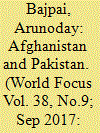

|
|
|
|
|
| Summary/Abstract |
Ever since Alexander invaded India in 3rd century BC, the Indian rulers have been preoccupied with strategic dynamics of their North-West region. Many subsequent invasions and mingling of races, religions and people was followed by a more coherent and systematic ascendance of Moguls in India. Though British came to India from sea routes, the North-West continued to remain a persistent irritant for various reasons.
|
|
|
|
|
|
|
|
|
|
|
|
|
|
|
|
| 2 |
ID:
130006
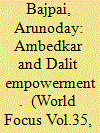

|
|
|
|
|
| Publication |
2014.
|
| Summary/Abstract |
Dr B R Ambedkar was convinced that unless the marginalized sections of Indian society secured the political power, it was not possible to completely wipe out all social, legal and cultural disabilities, from which they suffered (Desai: 1959). Thus, for the political organization and political mainstreaming of Dalits, he pleaded for their representation in legislatures in the Round Table Conferences, 1930-32, convened by the British government. Both Ambedkar and British government supported Dalit representation in the legislatures on the basis of separate electorate, which meant that in the reserved constituencies only Dalits would be allowed to vote. This was the crux of Communal Award announced by the British government in 1932.
|
|
|
|
|
|
|
|
|
|
|
|
|
|
|
|
| 3 |
ID:
179630
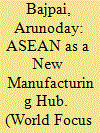

|
|
|
|
|
| Summary/Abstract |
The issue of emerging regional manufacturing hub and supply chain in the South-East Asia is closely related with the shift in China’s economy in last few years. The pandemic has also hastened the disruption of existing network of manufacturing and supply of goods and services, which were dominated by China. The intensifying trade war between the US and China, the two largest economies of the world, and China’s growing isolation in the western world and elsewhere have invited the attention of scholars about its possible consequences for the shift in the existing manufacturing and supply chains in the region. The shift may be marked by the emergence of ASEAN as a new centre of manufacturing and supply chain, hitherto dominated by China. But the process of this shift is not easy and strait. It has many ifs and buts which need to be understood.
|
|
|
|
|
|
|
|
|
|
|
|
|
|
|
|
| 4 |
ID:
173530
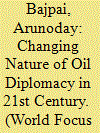

|
|
|
|
|
| Summary/Abstract |
The oil diplomacy is inherent in the nature of oil as a strategic resource and unequal distribution across the world. The versatile nature of oil products make them indispensible for transportation and economic development. During the First World War the use of oil in tanks and fighter plans proved its strategic value of great significance as it can turn around the fate of nations.
|
|
|
|
|
|
|
|
|
|
|
|
|
|
|
|
| 5 |
ID:
186739
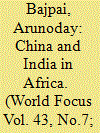

|
|
|
|
|
| Summary/Abstract |
China’s economic and strategic engagement with African countries has grown up in last two decades both in terms of scale in diversity. China has become the largest trading partner as well as largest creditor of Africa in recent years. However, China’s economic diplomacy has come under scrutiny due to its focus on resource extraction, rising debt burden of African countries due to Chinese loans and secrecy and corruption in China’s economic operations in Africa. Yet African countries find Chinese finance as easy source for development in comparison to the western financial provisions.
|
|
|
|
|
|
|
|
|
|
|
|
|
|
|
|
| 6 |
ID:
163007
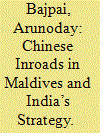

|
|
|
|
|
| Summary/Abstract |
The entire Indian Ocean holds crucial significance for India’s security and economic interests. The recent Chinese strategic and commercial inroads by China in Maldives are part of her larger strategy to expand her strategic influence in the Indo-Pacific region. The Chinese design appears benign in the first impression as it moves from gaining economic dominance toconsolidating strategic influence. India needs to not only strengthen her defence capabilities but also to develop bilateral and multilateral strategic partnership to ensure peace, stability, freedom of navigation and rule based order in the entire Indian Ocean. The bilateral approach towards neighbours needs better understanding of their fragile political landscape and domestic politics.
|
|
|
|
|
|
|
|
|
|
|
|
|
|
|
|
| 7 |
ID:
141245
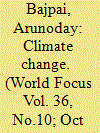

|
|
|
|
|
| Summary/Abstract |
There is no need to emphasize the fact that the climate change crisis is a major global challenge of our times. However, the climate change crisis is insurmountable, once it crosses the threshold. It threatens not only our present generations but also the future of entire humanity. The impacts of climate change, once set in, are not reversible in the short run. The assessment of the global warming trends and their likely adverse consequences is made by the Inter-Governmental Panel on Climate Change in its five Assessment Reports published respectively in the years 1990, 1996, 2001, 2007 and 2014. The gist of these reports is that the global mean temperature has increased by 0.3 to 0.6 degree centigrade in last 100 years but it is likely to increase by 0.3 C per annum in 21st century. The Synthesis Report of the Fifth Assessment Report (IPCL: 2014) remarks, 'Continued emission of greenhouse gases will cause further warming and long-lasting changes in all components of the climate system, increasing the likelihood of severe, pervasive and irreversible impacts for people and ecosystems'.
|
|
|
|
|
|
|
|
|
|
|
|
|
|
|
|
| 8 |
ID:
111670
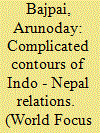

|
|
|
| 9 |
ID:
145915
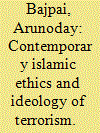

|
|
|
|
|
| Summary/Abstract |
The term 'ethics' is derived from the ancient Greek word 'ethikos', which is derived from 'ethos' meaning custom or habit. As such ethics has two meanings. First, it refers to as set of moral principles which guide the human conduct and behaviour in different situations. These principles determine the right and wrong of human conduct. Second, ethics is a branch of philosophy, which is concerned with the systematic study of moral principles. The ethics as a code of conduct for various human activities and vocations, change, evolve and adjust with changing conditions. The Greek thinkers had sanctioned slavery, which continued for many centuries, however, it is unthinkable in the contemporary world. As new fields of human activities emerge, which require distinctive management and regulations, the new codes of ethics also evolved. Thus, now we have medical ethics, environmental ethics or business ethics and so on.
|
|
|
|
|
|
|
|
|
|
|
|
|
|
|
|
| 10 |
ID:
138361
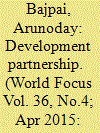

|
|
|
|
|
| Summary/Abstract |
India needs to address various challenges to make her development partnership more effective. If India's development partnership has to work as 'soft power' instrument of India's economic diplomacy, it has to be motivated by the spirit of sharing, equal partnership, mutual benefit, and India's entitled national interest.
|
|
|
|
|
|
|
|
|
|
|
|
|
|
|
|
| 11 |
ID:
158883
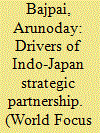

|
|
|
|
|
| Summary/Abstract |
India, the largest functional democracy of the world and the Japan, the most prosperous democracy are posed for deeper multidimensional engagement. Though India has signed strategic partnership agreement with more than 30 countries, but the India-Japan Special Strategic and Global Partnership stands apart not only in view of its historical background but also in terms of its present and long term commonality of interests.
|
|
|
|
|
|
|
|
|
|
|
|
|
|
|
|
| 12 |
ID:
110333
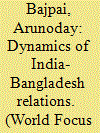

|
|
|
| 13 |
ID:
151124


|
|
|
|
|
| Summary/Abstract |
An idea and the reality encapsulating that idea have circular relation. Both follow each other and strengthen or weaken each other depending upon the level of congruence between the idea and reality. Though, survival of any new idea depends on this congruence, the idea has always a message and indicates a trend. The idea of ‘Indo-Pacific’ is a decade old, but it continues to evolve and strengthen as it represents a geo-strategic and geo-economic reality of our time. It replaced the notion of AtlanticPacific, which has been a dominant strategic framework with underlying political and economic significance for nearly half century after the end of cold war.
|
|
|
|
|
|
|
|
|
|
|
|
|
|
|
|
| 14 |
ID:
168454
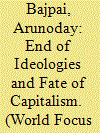

|
|
|
|
|
| Summary/Abstract |
Since the days of Plato and Aristotle, the ideas and the ideologies have been playing important role in the guiding the human actions, given meaning to those actions and competing for space and acceptability. What is ideology? Ideology is not just a group of ideas but a self contained world view, which not only gives a distinct meaning to existing reality but also works as a guiding framework for future action.
|
|
|
|
|
|
|
|
|
|
|
|
|
|
|
|
| 15 |
ID:
173623
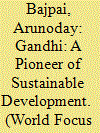

|
|
|
|
|
| Summary/Abstract |
Gandhi is a global icon. This is not because he liberated India from the British rule. This is because he articulated, experimented and applied some fundamental ideas, which have universal appeal to human society, cutting across time and space. The humanity is faced with grave challenges of mindless violence, growing social disorder, terrorism, selfish individualism, consumerism, intolerance, and environmental degradation.
|
|
|
|
|
|
|
|
|
|
|
|
|
|
|
|
| 16 |
ID:
110398
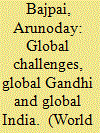

|
|
|
| 17 |
ID:
127523
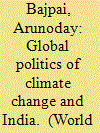

|
|
|
| 18 |
ID:
133437
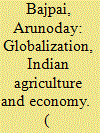

|
|
|
|
|
| Publication |
2014.
|
| Summary/Abstract |
Globalization is a buzz world today. In its present form, it has dominated academic discourse and the minds of policy makers since the early 1990s. it has many dimensions-economic, political, social and cultural- enforcing and sustaining each other. The ongoing from of globalization, anchored to the ideology of neo-liberalism, is a comprehensive process touching all aspect of human lives. Globalization may be viewed both as an end product as well as a process. The consequential essence of all dimensions of globalization in the increased access to global platform, facilitated by modern means of communication technology, resulting in increased among peoples and nations.
|
|
|
|
|
|
|
|
|
|
|
|
|
|
|
|
| 19 |
ID:
093347
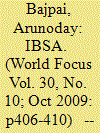

|
|
|
| 20 |
ID:
159728
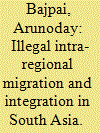

|
|
|
|
|
| Summary/Abstract |
The region of South Asia consists of eight members of SAARC namely India, Pakistan, Bangladesh, Sri Lanka, Maldives, Nepal, Bhutan and Afghanistan. South Asia has 16 percent of the total global population with 3.4 percent of global land area. However, the economic capacities and development index of South Asia are not commensurate with the population and natural resources of the region.
|
|
|
|
|
|
|
|
|
|
|
|
|
|
|
|
|
|
|
|
|